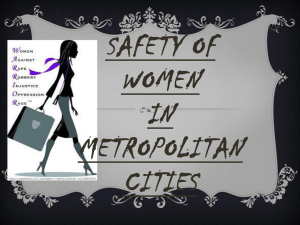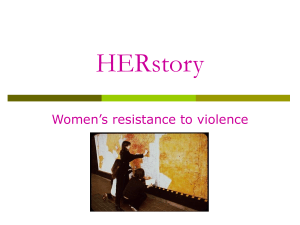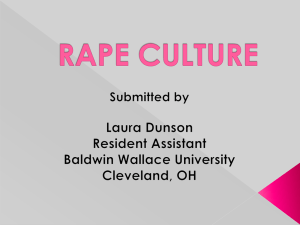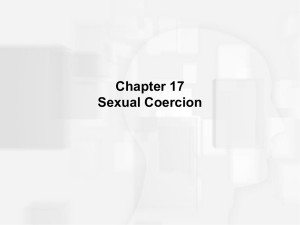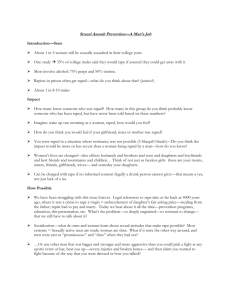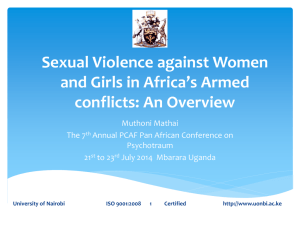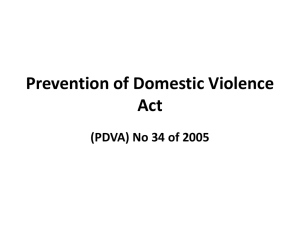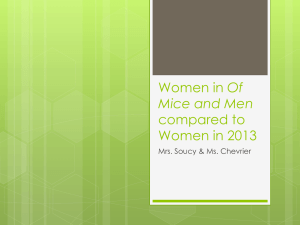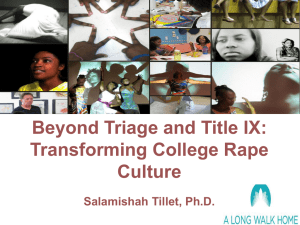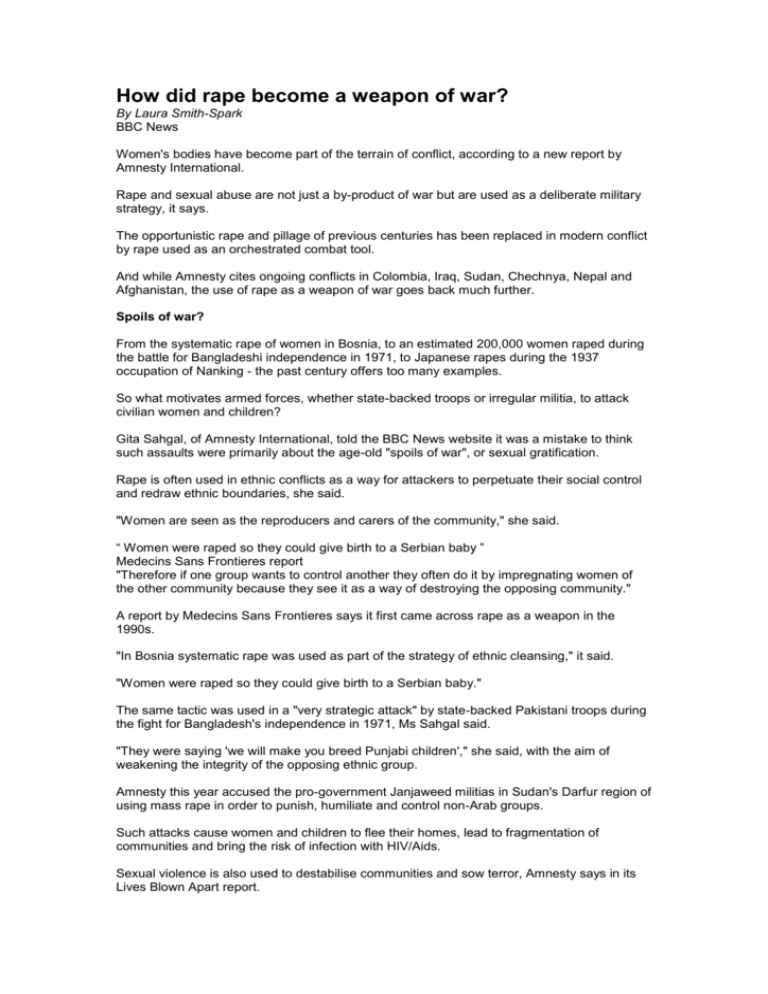
How did rape become a weapon of war?
By Laura Smith-Spark
BBC News
Women's bodies have become part of the terrain of conflict, according to a new report by
Amnesty International.
Rape and sexual abuse are not just a by-product of war but are used as a deliberate military
strategy, it says.
The opportunistic rape and pillage of previous centuries has been replaced in modern conflict
by rape used as an orchestrated combat tool.
And while Amnesty cites ongoing conflicts in Colombia, Iraq, Sudan, Chechnya, Nepal and
Afghanistan, the use of rape as a weapon of war goes back much further.
Spoils of war?
From the systematic rape of women in Bosnia, to an estimated 200,000 women raped during
the battle for Bangladeshi independence in 1971, to Japanese rapes during the 1937
occupation of Nanking - the past century offers too many examples.
So what motivates armed forces, whether state-backed troops or irregular militia, to attack
civilian women and children?
Gita Sahgal, of Amnesty International, told the BBC News website it was a mistake to think
such assaults were primarily about the age-old "spoils of war", or sexual gratification.
Rape is often used in ethnic conflicts as a way for attackers to perpetuate their social control
and redraw ethnic boundaries, she said.
"Women are seen as the reproducers and carers of the community," she said.
“ Women were raped so they could give birth to a Serbian baby ”
Medecins Sans Frontieres report
"Therefore if one group wants to control another they often do it by impregnating women of
the other community because they see it as a way of destroying the opposing community."
A report by Medecins Sans Frontieres says it first came across rape as a weapon in the
1990s.
"In Bosnia systematic rape was used as part of the strategy of ethnic cleansing," it said.
"Women were raped so they could give birth to a Serbian baby."
The same tactic was used in a "very strategic attack" by state-backed Pakistani troops during
the fight for Bangladesh's independence in 1971, Ms Sahgal said.
"They were saying 'we will make you breed Punjabi children'," she said, with the aim of
weakening the integrity of the opposing ethnic group.
Amnesty this year accused the pro-government Janjaweed militias in Sudan's Darfur region of
using mass rape in order to punish, humiliate and control non-Arab groups.
Such attacks cause women and children to flee their homes, lead to fragmentation of
communities and bring the risk of infection with HIV/Aids.
Sexual violence is also used to destabilise communities and sow terror, Amnesty says in its
Lives Blown Apart report.
In Colombia, rival groups rape, mutilate and kill women and girls in order to impose "punitive
codes of conduct on entire towns and villages", so strengthening their control.
Act with impunity
The strategic use of rape in war is not a new phenomenon but only recently has it begun to
be documented, chiefly in the Democratic Republic of Congo, Colombia and Sudan, said Ms
Sahgal.
And even after conflicts are resolved, few countries seem willing to tackle what is often seen
as a crime against individual women rather than a strategy of war.
In many nations the collapse of the rule of law leaves them unable to deal with allegations of
rape, while in others women feel too exposed to stigma to accuse their attackers.
International courts have tackled some cases in Bosnia, where Muslim women were forced
into sexual slavery in the town of Foca in the 1990s, and in Rwanda, but the vast majority of
perpetrators act with impunity.
Sexual violence as a weapon of war
From Unicef Website
Violence against women, especially rape, has added its own brand of shame to recent wars.
From conflicts in Bosnia and Herzegovina to Peru to Rwanda, girls and women have been
singled out for rape, imprisonment, torture and execution. Rape, identified by psychologists
as the most intrusive of traumatic events, has been documented in many armed conflicts
including those in Bangladesh, Cambodia, Cyprus, Haiti, Liberia, Somalia and Uganda.
Systematic rape is often used as a weapon of war in 'ethnic cleansing'. More than 20,000
Muslim girls and women have been raped in Bosnia since fighting began in April 1992,
according to a European Community fact-finding team. Teenage girls have been a particular
target in Bosnia and Herzegovina and Croatia, according to The State of the World's Children
1996 report. The report also says that impregnated girls have been forced to bear 'the
enemy's' child.
In some raids in Rwanda, virtually every adolescent girl who survived an attack by the militia
was subsequently raped. Many of those who became pregnant were ostracized by their
families and communities. Some abandoned their babies; others committed suicide.
Sexual violation of women erodes the fabric of a community in a way that few weapons can.
Rape's damage can be devastating because of the strong communal reaction to the violation
and pain stamped on entire families. The harm inflicted in such cases on a woman by a rapist
is an attack on her family and culture, as in many societies women are viewed as repositories
of a community's cultural and spiritual values.
In addition to rape, girls and women are also subject to forced prostitution and trafficking
during times of war, sometimes with the complicity of governments and military authorities.
During World War II, women were abducted, imprisoned and forced to satisfy the sexual
needs of occupying forces, and many Asian women were also involved in prostitution during
the Viet Nam war. The trend continues in today's conflicts.
The State of the World's Children 1996 report notes that the disintegration of families in times
of war leaves women and girls especially vulnerable to violence. Nearly 80 per cent of the 53
million people uprooted by wars today are women and children. When fathers, husbands,
brothers and sons are drawn away to fight, they leave women, the very young and the elderly
to fend for themselves. In Bosnia and Herzegovina, Myanmar and Somalia, refugee families
frequently cite rape or the fear of rape as a key factor in their decisions to seek refuge.
During Mozambique's conflict, young boys, who themselves had been traumatized by
violence, were reported to threaten to kill or starve girls if they resisted the boys' sexual
advances. Sexual assault presents a major problem in camps for refugees and the displaced,
according to the report. The incidence of rape was reported to be alarmingly high at camps
for Somali refugees in Kenya in 1993. The camps were located in isolated areas, and
hundreds of women were raped in night raids or while foraging for firewood.
UNHCR (the Office of the UN High Commissioner for Refugees) has had to organize security
patrols, fence camps with thorn bushes and relocate the most vulnerable women to safer
areas. Some rape victims who were ostracized were moved to other camps or given priority
for resettlement abroad. UNHCR has formal guidelines for preventing and responding to
sexual violence in the camps, and it trains field workers to be more sensitive to victims'
needs. Refugee women are encouraged to form committees and become involved in camp
administration to make them less vulnerable to men who would steal their supplies or force
them to provide sex in return for provisions.
The high risk of infection with sexually transmitted diseases (STDs), including HIV/AIDS,
accompanies all sexual violence against women and girls. The movement of refugees and
marauding military units and the breakdown of health services and public education worsens
the impact of diseases and chances for treatment. For example, one study has suggested
that the exchange of sex for protection during the civil war in Uganda in the 1980s was a
contributing factor to the country's high rate of AIDS.
War and civil unrest also contribute to violence in the home, according to recent studies.
Death, upheaval and poverty increase tensions within the family and the likelihood of violence
against girls and women. Men who feel that they have lost the ability to protect their women
may compensate by exercising violent control over them at home.
UNHCR, the United Nations Population Fund (UNFPA) and UNICEF are promoting
reproductive health services for refugees to counter high birth rates, maternal mortality, STDs
and HIV/AIDS. UNICEF provides support for women affected by armed conflict in countries
such as Bosnia and Herzegovina, Burundi, Croatia, Georgia, Liberia, Rwanda, Somalia and
the Sudan.
The post-World War II Nuremberg trials condemned rape as a crime against humanity.
Governments must be willing to enforce international law and codes of conduct, while also
supporting counselling and other services for victims.

